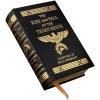Dak
mentat
Dude this is on my list too. Heard the author on a podcast and got super intrigued. Let me know how it is.
It's been repeatedly repped for milpsychs so had to get it.
Dude this is on my list too. Heard the author on a podcast and got super intrigued. Let me know how it is.
Dune should be bingeread outside in a sunchair on a sweltering summer's day.



Any good recommendations for books about the German Empire or general German history?


Any good recommendations for books about the German Empire or general German history?
Yeah, here's a good handy history book on Nazi Germany: The Rise and Fall of the Third Reich, by William L. Shirer
Here are a couple of photos of the book,
View attachment 15326 View attachment 15327
Here are some links to the book on Amazon and Ebay,
https://www.amazon.com/Rise-Third-Reich-History-Germany/dp/B00DQVUK14/ref=sr_1_7?
ie=UTF8&qid=1532621035&sr=8-7&keywords=The+Rise+and+Fall+of+the+Third+Reich+Book+by+William+L.+Shirer
https://www.amazon.com/Rise-Fall-Th...preST=_SX218_BO1,204,203,200_QL40_&dpSrc=srch
https://www.amazon.com/Rise-Fall-Th...+of+the+Third+Reich+Book+by+William+L.+Shirer
https://www.ebay.com/itm/The-Rise-and-Fall-of-the-Third-Reich-by-William-L-Shirer-1960-Hardcover/232863370083?hash=item3637bd0b63:g:Ne4AAOSwTLpbL~qO&_sacat=0&_nkw=The+Rise+and+Fall+of+the+Third+Reich+Book+by+William+L.+Shirer&_from=R40&rt=nc&_trksid=m570.l1313
This book is a fairly large volume containing a wealth of information about the rise of Nazi Germany which many young people of today have seemed to forgotten. One of the features of this book that really stand out in my mind was how the Nazis infiltrated the Christian Churches in Germany. That is a good lesson for today. There are many valuable insights about the rise of Nazi Germany in this book that may be worth your time in reading.
Generally, as a rule, history books are subject to political paradigms. This means that whenever society becomes corrupt and political divisions emerge over certain controversial issues, then books written during that time of strife and division are not generally encouraged. When it comes to books written about Nazi Germany it is better to read books written before the turn of the century. I won't even read a Dictionary written past 2007. So in times when politics is writing books and truth is being lost it is always recommended to read those books which were written before that paradigm of strife and political divisions. With other historical issues you might not want to read anything older than 300 years old. I collect documents and over the years have accumulated a museum worth of useful information. But each topic is sorted by whatever paradigm was corrupt, as many of our modern arguments which cause division can usually be refuted by very old books and sometimes books over thousand years old. Case and point: Does the Bible teach round or flat earth? This is an argument won before the 20th century and confirmed in the first four centuries of Christ. Likewise with Nazi Germany. We realize how accusation of modern times label everyone a Nazi who does not conform to radical socialism. So we open up the older books to find out what a Nazi is.
I'm not an expert on Nazi Germany. My main field in ancient literature. But the book I recommended antedates our current political divisions and is a very good read to be sure
That's not what I asked for but thanks. I want German history up through WWI/Weimar Republic. Nazi Germany shit is so oversaturated at this point I couldn't give two fucks about it.
Something more recent which you might like is Isabel Hull's Absolute Destruction. It's a history of German military culture from the Franco-Prussian War to WWI. It's quite critical and I'm guessing you won't agree with all of it (I didn't), but it's an intriguing and well-written read. I have the PDF if you would like. It's quite a pretty soft cover too if you want to pick up a hard copy.
Send it my way if you don't mind. Sounds like what I'm wanting. I did notice there isn't much in history for pre Weimar in English. Sucks. I only know a little bit of German so that doesn't help either.
I wouldn't listen to anything said here, whether regarding Shirer, understanding of historical perspective and the merit or lack thereof of its change overtime, or political paradigms, no offense @FEZZILLA .
The classic starting point for Imperial Germany is Hans Ulrich-Wehler's The German Empire. I don't have a PDF of it on hand, but it's probably easy enough to find. Something more recent which you might like is Isabel Hull's Absolute Destruction. It's a history of German military culture from the Franco-Prussian War to WWI. It's quite critical and I'm guessing you won't agree with all of it (I didn't), but it's an intriguing and well-written read. I have the PDF if you would like. It's quite a pretty soft cover too if you want to pick up a hard copy.
That's not what I asked for but thanks. I want German history up through WWI/Weimar Republic.
Any good recommendations for books about the German Empire or general German history?
Don't get pissy when it isn't clear what you were asking for.


